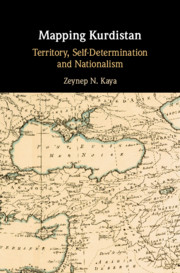Book contents
- Mapping Kurdistan
- Mapping Kurdistan
- Copyright page
- Dedication
- Contents
- Maps
- Acknowledgements
- Note on Text
- Abbreviations
- Introduction
- 1 Kurdish Territoriality under Ottoman Rule
- 2 Orientalist Views of National Identity and Colonial Maps of Kurdistan
- 3 Wilsonian Self-Determination
- 4 Kurdish Nationalism during Decolonisation and the Cold War
- 5 Kurds and the International Society after the Cold War
- 6 Kurdish Diaspora
- Conclusion
- Bibliography
- Index
2 - Orientalist Views of National Identity and Colonial Maps of Kurdistan
Published online by Cambridge University Press: 12 June 2020
- Mapping Kurdistan
- Mapping Kurdistan
- Copyright page
- Dedication
- Contents
- Maps
- Acknowledgements
- Note on Text
- Abbreviations
- Introduction
- 1 Kurdish Territoriality under Ottoman Rule
- 2 Orientalist Views of National Identity and Colonial Maps of Kurdistan
- 3 Wilsonian Self-Determination
- 4 Kurdish Nationalism during Decolonisation and the Cold War
- 5 Kurds and the International Society after the Cold War
- 6 Kurdish Diaspora
- Conclusion
- Bibliography
- Index
Summary
This chapter provides the conceptual and historical underpinnings of the cartographic manifestation of the idea of Kurdistan through an overview of historical documents and the Kurdish revolts in the nineteenth century in the Ottoman Empire. It argues that Kurdish nationalist historiography today interprets the historical uses of Kurdistan in history and the revolts through a retrospective lens. In so doing, it attributes modern meanings of territory and nation to past references of Kurdistan. The chapter discusses the use of the concept of Kurdistan in historical texts from the early thirteenth century to mid-nineteenth century and situates this discussion within historical processes such as the expansion of the Ottoman rule to eastern Anatolia, Ottoman–Safavid rivalry in the sixteenth century and the Ottoman Empire’s centralisation policies and the Kurdish revolts against the Ottomans in the nineteenth century. These revolts give significant insights to how Kurdish tribal leaders defined their territoriality. However, these revolts were the result of tribal leaders’ efforts to maintain their territoriality in the face of Ottoman centralisation policies, but these efforts were not underlined by nationalist sentiments in the way nationalism was defined in Europe in the nineteenth century or defined by Kurds today.
Keywords
- Type
- Chapter
- Information
- Mapping KurdistanTerritory, Self-Determination and Nationalism, pp. 43 - 63Publisher: Cambridge University PressPrint publication year: 2020



